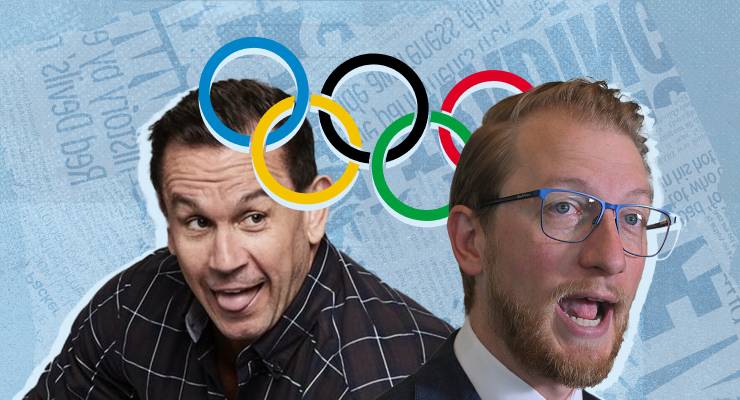
Media bosses clash over AI in newsrooms
This week a smattering of AI developers, students and journalists gathered in the bowels of the University of Technology Sydney for an occasionally heated panel about how Australian newsrooms were taking on the use of generative AI. The university’s Centre for Media Transition launched its “Gen AI and Journalism” report, the research for which included interviews with Guardian Australia editor Lenore Taylor and The Sydney Morning Herald editor Bevan Shields. Launching the report was ABC’s director of news and investigations Justin Stevens on the panel alongside Daily Mail executive editor Barclay Crawford.
Stevens told those gathered the industry was “completely ill-prepared” for the threats that AI poses to newsrooms. He did, however, see it as an opportunity for human journalism to “stand out”.
“You can’t send a chatbot into a war zone,” he said.
Crawford railed against the impact AI could have on our democracy. AI is created by the “elites”, he said, who “have very different views to the rest of us”. Google Search is skewed in favour of left-wingers, Crawford claimed, pointing to Guardian Australia’s search engine optimisation success as evidence of this.
The panel got fiery when Stevens proselytised over whether AI would be used ethically, or “in a cynical way” for what he termed “junk journalism” — “chasing views over trust”. This drew Crawford’s ire, who said media companies “need eyeballs”.
“Unfortunately, a lot of stuff people read isn’t great investigative journalism,” the Daily Mail boss argued.
A moment of pause took hold of the room before Stevens shot back: “I don’t reckon it’s a choice between profit and trust.”
Media Briefs makes no comment on why Crawford may have been particularly incensed by a general reference to “junk journalism”.
Asked about media literacy standards dropping among young people, Stevens took a rare stab at public policy, suggesting that there may be room in schools and curriculums around the country for more media literacy education.
News Corp set for pale, stale Olympics
News Corp this week announced its 45-strong team that will travel to Paris to cover the 2024 Summer Olympics — a dream gig for most. In an internal memo seen by Crikey, executive editor Michael Miller expressed his pride at the youth of the team heading over to France, but those quotes were excluded from the company’s press release.
Perhaps that’s because the team seems to be made up of mostly senior staff. Not many News Corp journalists under the age of 30 are headed to the continent, with the apparent exception of audio producer Tabby Wilson. Despite the Olympics being a celebration of diversity, things are a bit thin on the ground in Holt St’s delegation, with Jawoyn woman Hannah Hollis one of the only reporters of colour on the team, as well as one of the only women, with men making up 73% of the contingent.
Luckily for News Corp readers however, they will get Olympic coverage from the likes of The Courier-Mail’s state political editor Hayden Johnson, Vogue executive editor Jessica Montague, and gossip columnist Jackie Epstein.
Former Newcastle Knights five-eighth Matty Johns will also feature, although much like how your correspondent often gets Matty mixed up with his more successful brother Andrew, News Corp may be confused — our little provincial game of rugby league won’t be played at the Stade de France during the Olympics. Australia’s rugby sevens sides will feature instead, with the Wallaroos vying for a medal.
Media Briefs understands a number of young and diverse journalists from around the News Corp mastheads have expressed their displeasure at having been left out of the Paris delegation in favour of establishment favourites. With rights-holder Nine preparing to announce its own team, time will tell if the feeling is limited to Holt St’s up-and-comers.
News Corp did not reply for comment in time for publication.
Time is TikTok-ing for government
TikTok has been in the news again this week, with the US House of Representatives passing a bill that would require Chinese parent company ByteDance to sell the social media platform or see it banned in the United States.
The bill, if made law, would give ByteDance 165 days to divest from TikTok or risk American apps stores being banned from hosting or linking out to it. The bill now heads to the Senate, where it faces a somewhat less certain future — while the bill had bipartisan support in the House, a number of Republicans in particular see it as impacting First Amendment rights.
Closer to home, opposition home affairs spokesman James Paterson has called for Australia to follow suit, saying without movement, “Australians will continue to be exposed to the foreign interference and privacy risks of Chinese-government controlled TikTok”.
Prime Minister Anthony Albanese this week ruled out any changes based on the American vote, saying: “We have made decisions based on our own security assessments. We’re independent; we don’t follow other countries.”
Media Briefs contacted the minister for communications for comment, who handballed us to the minister for home affairs. The minister for home affairs didn’t respond in time for publication.
Moves
- Katy Watson moves from BBC South America to join the BBC in Sydney as Sydney correspondent.
- Wide World of Sports’ Chris de Silva moves to the ABC, joining as a digital sport journalist in Far North Queensland.
- The Sydney Morning Herald’s Caitlin Fitzsimmons is now an environment and climate reporter, having previously worked as a social affairs reporter.








Parody quote of the year, so far, was Albanese saying “We have made decisions based on our own security assessments. We’re independent; we don’t follow other countries.”
Perhaps he might like to have a chat about “Not following other countries” to Penny Wong with regard to funding a certain UN organisation in a very troubled part of the world.
The truth is that Australian Govts of both stripes rarely make “independent decisions”. “Marker missions” is a widely observed metric for when DFAT makes decisions. You’ve only got to look at our voting patterns at the UN General Assembly. Australian Governments, without exception, are petrified of standing separate from the herd no matter how hypocritical it makes us look when comparing rhetoric with action.
There was an exception, but that was a long time ago now, and these days people know better than to invite the attention of the organised crime wing of the US government…
I don’t suppose ‘Barkers’ Crawford railed against the negative effects – on a fragile democracy – of a biased, partisan, untruthful, misleading, subjective and closed-minded politicised viewsmedia? ….. Or is that okay because ‘that’s the m.o. of traditional media’?
“Elites” who have ‘different views from the rest of us’? That work in elite media positions, paid to use those ivory towers from which to rain down on a voting public their articulated espousals of theirs and their owners’ own personal spin on politics and anything else? To try to swing elections and policy to fit/benefit their ideology?
Took the biscuit, didn’t it
On the plus side we can now look forward to some hilariously incompetent attempts at commentary a la Eddie Maguire at the London Olympics.
Why don’t we get Roy and HG? They did a superb job in 2000.
Um – Roy and HG on News Corp?
That’d be even funnier.
Yes it would be hilarious – though I doubt News Corp would see the joke.
Rowan Dean and Sharri Markson? ….. “Rowan and Markson’s Laugh-In”?
Nice segue from junk journalism in the first article to junket journalism in the second.
But the second isn’t about journalism.
Boom-Tish.
Lovely thought, a Daily Mail gimp railing against artificial intelligence. The real threat to his business model is actual intelligence.